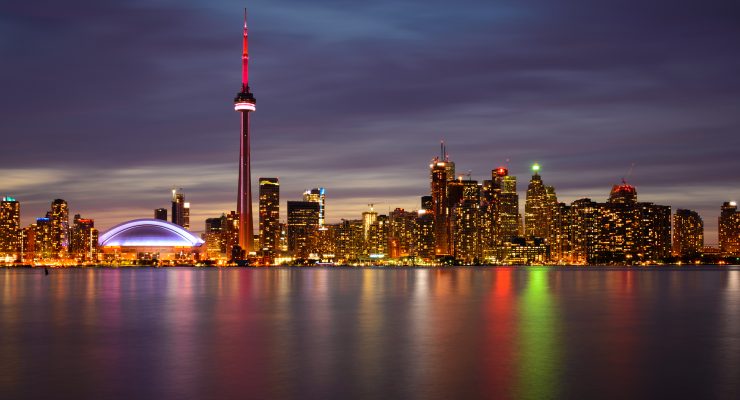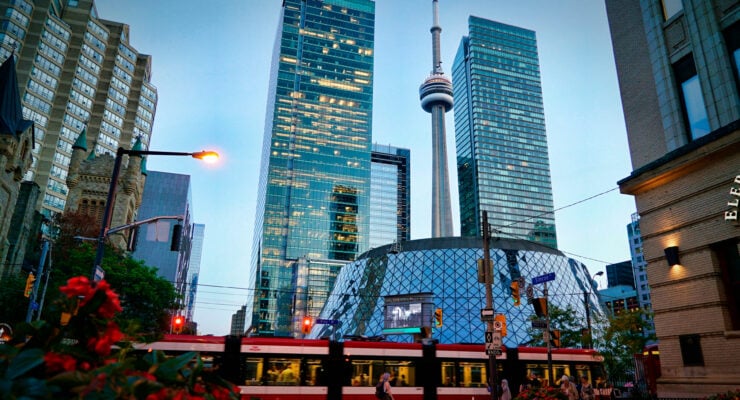Ontario is one of the most expensive provinces in Canada. However, Ontario is also huge and different cities have radically different costs of living. Toronto, the most populous city in Canada, has a high cost of living. Ottawa, despite being the capital city, is comparatively affordable. Life is much cheaper in smaller cities like London, Kingston, Windsor, Hamilton, etc.
Average wages in Ontario
The minimum wage is currently $16.55 per hour. In October 2024, this will rise to $17.20 per hour.
| Ontario | Average hourly wage for employees paid by the hour |
Average hourly wage for salaried employees |
|---|---|---|
| Average hourly wage (total employees – all industries) | $28 |
$45 |
| Business and finance | $30.83 |
$45.33 |
| Health care | $31.57 |
$37.29 |
| Education services | $22.22 |
$40.78 |
| Arts and entertainment | $22.23 |
$36.50 |
| Trades | $23.26 |
$44.23 |
| Manufacturing | $31.04 |
$44.93 |
| Sciences | $36.76 |
$48.04 |
Cost of living in Toronto
There’s no denying it, Toronto is expensive. CBC News loves to report on the crazy real estate market. The rest of Canada looks at Toronto the same way Australians see Sydney, the Japanese see Tokyo or the British see London—“you gotta be crazy or rich to live there!”
Yet, Toronto welcomes plenty of newcomers and Canadians. There’s a large job market, salaries are higher and, well, it’s a fun city!
Rent prices
According to the CMHC, a bachelor apartment in Toronto starts from $1,643 per month and a one-bedroom apartment (one bedroom + living room) starts from $2,000 per month. RentSeeker claims, on average, monthly rent for a bachelor apartment is $1,821 and a one-bed is $2,198.
It’s often cheaper to live in one of the cities of the Greater Toronto Area (GTA), like Mississauga, Oakville or York. However, this may not be the most practical solution for many, as public transit is less reliable and getting into Downtown Toronto can be difficult, especially if you don’t have a car. Prices are higher in the city of Toronto but with this comes more services, businesses and work opportunities.
CMHC data also reveals that:
- The most expensive neighbourhoods are downtown Toronto, within the Bathurst-Bayview Avenue-Dupont Street triangle. Rent is still high north of Bathurst and Bayview, but it goes down West of Bathurst and East of Bayview.
- Mississauga, Etobicoke, Scarborough, North York, York and East York tend to be cheaper but you will be far from Toronto. To get around, you’ll need a car or a monthly transit pass, which is another expense to take into account.
- Sharing a house with roommates may be a good solution, as this will be cheaper than renting a place to yourself.
- Rent is always higher in a condo (e.g. a newer building with front desk, gym, swimming pool and other shared amenities). A one-bedroom condo apartment is usually over $2,500 per month.
Public transportation
Toronto’s mass transit includes subways, buses and streetcars. The system is operated by the Toronto Transit Commission (TTC) and inter-regional commuter rail and bus service is provided by GO Transit.
You can use cash, your credit or debit card or a PRESTO card to pay for your fares. You can preload your PRESTO card online, at a machine or at a Shoppers Drug Mart.
- Single fare (PRESTO or debit/credit card): $3.30
- Single fare (cash): $3.35
- TTC monthly pass: $156
- TTC 12-month pass (per month, if you sign up for 12 months upfront): $143
For more details, read Fare and pass information.
If you decide to live in the GTA for cheaper, you may want to consider buying a car. Don’t forget to budget for insurance—it will probably be more expensive than you think because, despite driving experience in your home country, most companies won’t count this as Canadian experience and will apply the “new driver” tax. For more info, read Buying a car in Canada and remember to check Youset for the best prices on your auto insurance.
Food
Food prices are consistent with the examples given in the overview. You may even find produce a bit cheaper than average.
The key to finding cheaper food is to explore Toronto’s multicultural neighbourhoods (and it’s fun too!). Head to Chinatown, Little India, Greektown, Koreatown, Little Jamaica or Little Portugal for delicious specialties, imported food and regular, cheaper fresh produce. Plus, you’re supporting communities and small businesses!
Entertainment
- Restaurants: a meal and a non-alcoholic drink sets you back $25-$50 (plus tax and tip)
- Bars: a beer is $8 and your favourite cocktail $20-$25 (tax and tip included)
- Movie theatres: a ticket is $15 (but Cineplex offers cheaper admission on Tuesdays!)
Cost of living in Ottawa
The capital of Canada isn’t Montreal, Vancouver or Toronto—it’s Ottawa. Yes, for real. It’s picturesque, often praised for quality of life, and it’s pretty affordable compared to other capital cities across the globe.
Rent prices
According to the CMHC, the average monthly rent in Ottawa for a bachelor apartment is $1,172 and a one-bedroom apartment is $1,415. Other sources like RentSeeker claim the average monthly rent for a bachelor is $1,480 and a one-bed is $1,713.
The neighbourhoods of Little Italy, Wellington West, Chinatown, Tunney’s Pasture and Mechanicsville are central and affordable, while the Glebe, South Ottawa and Lowertown are more expensive. Vanier also offers cheap rentals.
Ottawa is often referred to as the “National Capital Region,” a federal designation that includes the neighbouring city of Gatineau, Quebec, and surrounding urban and rural communities. Living in Gatineau, just across the river, can be a tempting option because rent prices are cheaper.
Gatineau is quieter than Ottawa and the tax system is different in Quebec, so weigh up the pros and cons. The biggest downside all locals complain about is traffic—rush hour on the interprovincial bridge is complete madness, as many Gatineau residents commute into Ottawa. However, Gatineau can work for you if you don’t work the traditional 9-5 (or 8-4) office hours.
Public transportation
OC Transpo operates Ottawa’s bus network and the O-train.
The Société de Transport de l’Outaouais (STO) operates on the Quebec side. Both systems connect (and a few buses run between the two cities) but they remain two distinct companies, each with their own passes and fares.
OC Transpo fares:
- Single trip: $3.80 if paying by card (Presto, ParaPay, credit/debit) or $3.85 if paying by cash
- Monthly pass (adult): $128.75
- Day pass: $11.75
You can also check the current fares on the OC Transpo website.
Food
Food prices for produce, dairy products, eggs, meat and fish tend to be higher in Ottawa than in other Canadian cities.
Skip the Byward Market for produce; head to the Lansdowne farmer’s market or the Parkdale market. Farm Boy, a retailer operating in Ontario and headquartered in Ottawa, offers a large selection of fresh produce, organic foods and natural foods. You can also check out T&T, a huge supermarket with food products from all over Asia and a selection of take-out food.
Entertainment
Prices in Ottawa are similar to Toronto.
















 Français
Français English
English




0 comments
{{like.username}}
Loading...
Load more